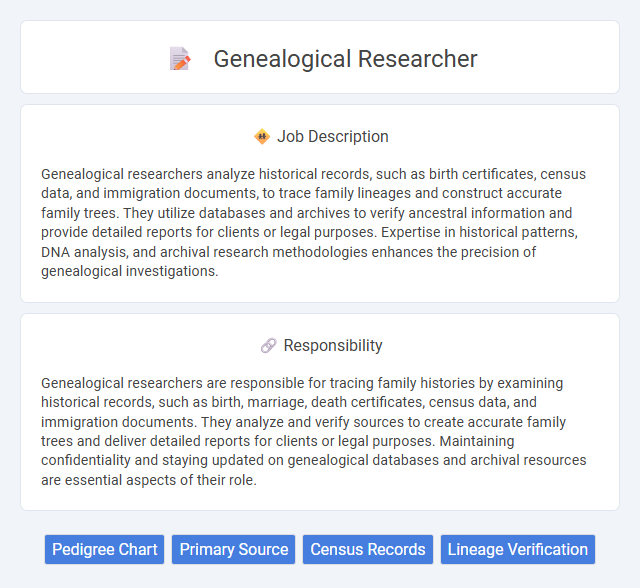
Genealogical researchers analyze historical records, such as birth certificates, census data, and immigration documents, to trace family lineages and construct accurate family trees. They utilize databases and archives to verify ancestral information and provide detailed reports for clients or legal purposes. Expertise in historical patterns, DNA analysis, and archival research methodologies enhances the precision of genealogical investigations.
Individuals with strong analytical skills and a deep interest in history and family lineage are likely to be well-suited for a genealogical researcher role. Those who enjoy detailed investigative work and have patience for piecing together complex information may find this career fulfilling. However, people who prefer fast-paced environments or less solitary tasks might find this job challenging.
Qualification
A genealogical researcher requires a strong background in historical research, genealogy databases, and archival analysis, often supported by a bachelor's degree in history, anthropology, or related fields. Expertise in using specialized genealogy software such as Ancestry.com, MyHeritage, and FamilySearch is essential to trace lineage accurately. Attention to detail, analytical skills, and proficiency in public records, census documents, and DNA results interpretation are crucial qualifications for successful genealogical research.
Responsibility
Genealogical researchers are responsible for tracing family histories by examining historical records, such as birth, marriage, death certificates, census data, and immigration documents. They analyze and verify sources to create accurate family trees and deliver detailed reports for clients or legal purposes. Maintaining confidentiality and staying updated on genealogical databases and archival resources are essential aspects of their role.
Benefit
Genealogical researchers likely provide valuable insights into family histories, offering individuals a deeper understanding of their ancestry and heritage. Their expertise in uncovering historical records and connecting family lines can potentially bring emotional satisfaction and a sense of identity to clients. This role might also open opportunities for collaboration with historians and archives, enhancing professional growth and networking possibilities.
Challenge
Genealogical researchers likely face the challenge of navigating incomplete or inconsistent historical records, which can complicate constructing accurate family trees. The probability of encountering conflicting information requires strong analytical skills and careful verification processes. Persisting through such uncertainties may demand creativity and patience to uncover elusive ancestral connections.
Career Advancement
Genealogical researchers can advance their careers by gaining expertise in historical records, DNA analysis, and archival research techniques. Pursuing certifications such as those offered by the Board for Certification of Genealogists enhances credibility and opens opportunities for senior research roles or consultancy positions. Developing strong client communication skills and specializing in niche areas like forensic genealogy or ethnic heritage increases the potential for leadership roles and higher earnings.
Key Terms
Pedigree Chart
A genealogical researcher specializes in tracing family histories by meticulously analyzing pedigree charts to identify ancestors and establish familial relationships. Utilizing historical records, DNA data, and archival documents, they construct accurate lineage maps that reveal generational connections. Expertise in pedigree chart interpretation ensures the validation of heritage and supports legal, medical, or personal inquiries into ancestry.
Primary Source
A genealogical researcher specializes in tracing family histories through primary sources such as birth certificates, marriage licenses, census records, and wills. Expertise in analyzing original documents ensures accuracy in constructing family trees and verifying lineage connections. Access to archives, libraries, and digital databases is essential for uncovering authentic historical evidence.
Census Records
Genealogical researchers specialize in analyzing Census Records to trace family lineage and uncover ancestral connections by examining household data, birthplaces, ages, and occupations. Mastery of historical census datasets from various countries and time periods enhances the accuracy of constructing family trees and verifying relationships. Expertise in interpreting demographic trends and cross-referencing census information with vital records significantly strengthens genealogical investigations.
Lineage Verification
Genealogical researchers specializing in lineage verification meticulously analyze historical records, birth certificates, and family trees to authenticate ancestral connections. They utilize DNA evidence, census data, and archival documents to establish accurate family histories often required for inheritance claims or membership in hereditary organizations. Expertise in verification ensures credible verification of lineage, critical for legal and genealogical purposes.
 kuljobs.com
kuljobs.com